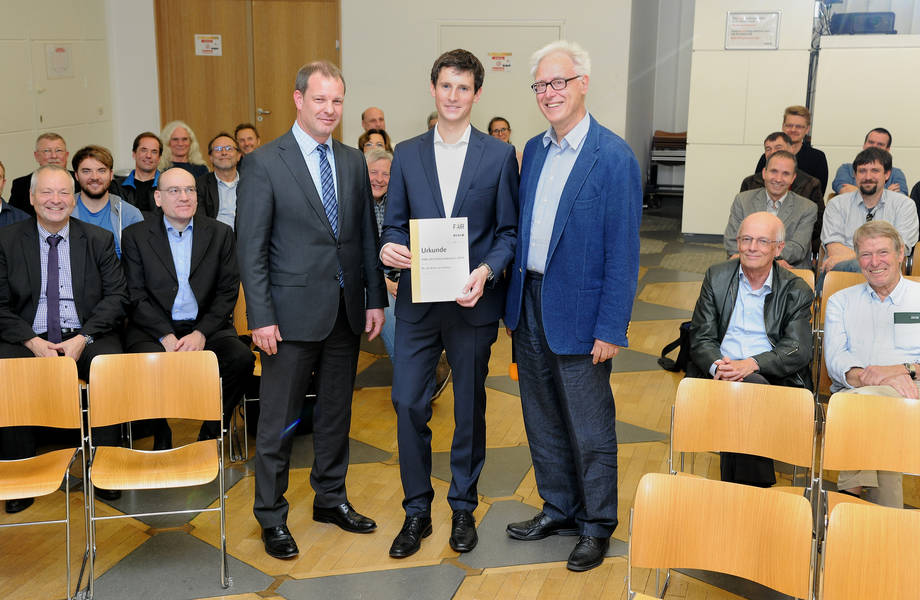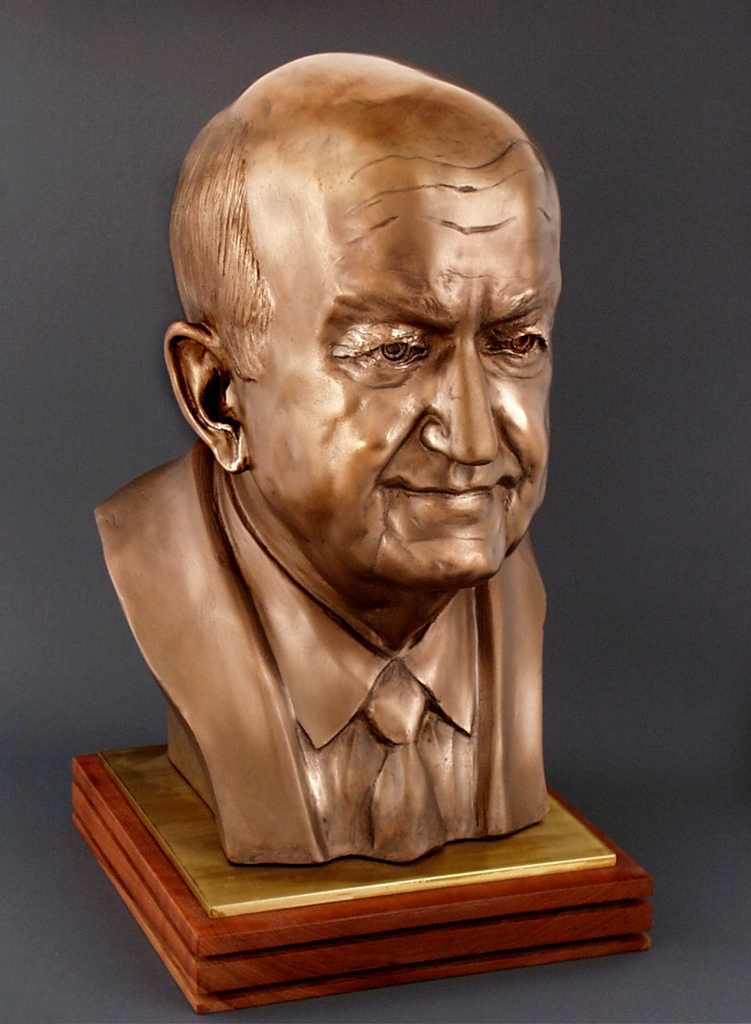Sie sehen momentan nur den öffentlichen Teil des GSI-Kuriers.
Um auch die GSI-internen Artikel angezeigt zu bekommen,
melden sie sich bitte an

Kurier - Messages from and for employees
Ausgabe: 47-2019 | 18.11. - 24.11.
News
News
FAIR-GSI PhD Award 2019 for Kristian König
Dr. Kristian König has been honored with the FAIR-GSI PhD Award 2019. The annual award is endowed with 1,000 euros by Pfeiffer Vacuum. The award was presented recently by Professor Karlheinz Langanke, Research Director of FAIR and GSI, and Daniel Sälzer, Managing Director of Pfeiffer Vacuum GmbH, in the framework of the GSI-FAIR Colloquium.
The research work for his thesis "Laser-Based High-Voltage Metrology with ppm Accuracy" was carried out by Kristian König in the research group of Professor Wilfried Nörtershäuser at the Technical University Darmstadt. The precise measurement of high voltages of several 10,000 volts is necessary in many areas of technology. Precision experiments in physics sometimes require accuracies down to one millionth of the measured voltage (1 ppm = 1 part per million). Kristian König has succeeded in measuring such voltages with the aid of a laser. He achieved this by accelerating ions (positively charged atoms) with the voltage to be measured and then measuring the influence of velocity on the "color" (frequency) of the light emitted by the ions. This method makes use of the Doppler effect which is known from daily life: If an ambulance with a siren approaches the observer at high speed, he hears a much higher tone than if the car were stationary. If the ambulance moves away, the sound becomes lower. If the pitch (frequency) is measured and the pitch of the resting siren is known, the speed of the ambulance can be calculated. Exactly the same happens with the light that atoms or ions emit in flight. This optical Doppler effect can be determined with extreme precision using lasers if the properties of the ion beam and the laser beam are controlled extremely well. Kristian König has constructed a setup enabling him to measure voltages to an accuracy of 5 ppm using this method. This accuracy is 20 times higher than what had been reached ever before with this technique. Such precise measurements are needed, for example, to determine the velocity of ions in the storage rings at GSI and at the future FAIR facility, and thus are crucial for a variety of precision experiments.
Pfeiffer Vacuum and GSI have a long-standing partnership. Vacuum solutions from Pfeiffer Vacuum have been used successfully in experimental setups at GSI for decades.
The annual FAIR-GSI PhD Award honors the best doctoral dissertation completed during the previous year. Eligible for nominations are dissertations that were financially supported by GSI as part of its strategic partnerships with the universities of Darmstadt, Frankfurt, Giessen, Heidelberg, Jena, and Mainz, or through the research and development program. In the framework of the Graduate School HGS-HIRe (Helmholtz Graduate School for Hadron and Ion Research), more than 300 PhD students currently perform research for their doctoral dissertations on topics closely related to GSI and FAIR.
FAIR-GSI-Doktorandenpreis 2019 für Kristian König

v.l.: Daniel Sälzer, Geschäftsführer der Pfeiffer Vacuum GmbH; Preisträger Dr. Kristian König; Professor Karlheinz Langanke, Forschungsdirektor von FAIR und GSI; Quelle: G. Otto, GSI
Dr. Kristian König wurde mit dem FAIR-GSI-Doktorandenpreis 2019 ausgezeichnet. Der Preis, der jährlich verliehen wird, ist mit 1.000 Euro dotiert und wird von Pfeiffer Vacuum gestiftet. Übergeben wurde der Preis vor Kurzem im Rahmen des GSI-FAIR-Kolloquiums durch Professor Karlheinz Langanke, Forschungsdirektor von FAIR und GSI, und Daniel Sälzer, Geschäftsführer der Pfeiffer Vacuum GmbH.
Die Doktorarbeit von Kristian König zum Thema „Laser-Based High-Voltage Metrology with ppm Accuracy“ wurde an der Technischen Universität Darmstadt in der Arbeitsgruppe von Professor Wilfried Nörtershäuser angefertigt. Die präzise Messung hoher Spannungen von einigen 10.000 Volt ist in vielen Bereichen der Technik notwendig. Präzisionsexperimente in der Physik erfordern teilweise Genauigkeiten bis auf ein Millionstel der gemessenen Spannung (1 ppm = 1 part per million). Kristian König ist es gelungen, solche Spannungen mit Hilfe eines Lasers zu messen. Dazu werden Ionen (positiv geladene Atome) mit der zu messenden Spannung beschleunigt und dann der Einfluss der Geschwindigkeit auf die "Farbe" (die Frequenz) des von den Ionen ausgesandten Lichtes gemessen. Dabei macht man sich den Dopplereffekt zunutze, den man aus dem täglichen Leben kennt: Kommt ein Krankenwagen mit Martinshorn mit hoher Geschwindigkeit auf den Beobachter zu, hört er einen deutlich höheren Ton, als wenn der Wagen stehen würde. Entfernt sich der Krankenwagen, wird der Ton hingegen tiefer. Wird die Tonhöhe (die Frequenz) gemessen und ist die des ruhenden Martinshorns bekannt, kann man auf die Geschwindigkeit des Krankenwagens schließen. Genau das gleiche geschieht auch mit dem Licht, das Atome oder Ionen im Flug aussenden. Dieser optische Dopplereffekt kann mit Lasern extrem präzise bestimmt werden, dabei muss man jedoch die Eigenschaften des Ionenstrahls und des Laserstrahls sehr gut unter Kontrolle haben. Kristian König hat eine Apparatur aufgebaut, mit der er in der Lage ist, mit diesem Verfahren Spannungen auf 5 ppm genau zu messen. Dies ist 20-mal genauer, als es je zuvor mit dieser Technik gelungen war. Solche genauen Messungen werden beispielsweise benötigt, um die Geschwindigkeit der Ionen in den Speicherringen bei GSI und zukünftig bei FAIR zu bestimmen, was für Präzisionsexperimente von entscheidender Bedeutung ist.
Pfeiffer Vacuum und GSI verbindet eine langjährige Partnerschaft. Vakuumlösungen von Pfeiffer Vacuum werden in den Anlagen bei GSI seit Jahrzehnten erfolgreich eingesetzt.
Der FAIR-GSI-Doktorandenpreis wird jährlich für die beste Doktorarbeit des vorangegangenen Jahres vergeben, die durch GSI im Rahmen der strategischen Partnerschaften mit den Universitäten in Darmstadt, Frankfurt, Gießen, Heidelberg, Jena, Mainz oder durch das Forschungs- und Entwicklungsprogramm gefördert wurde. Aktuell arbeiten im Rahmen der Graduiertenschule HGS-HIRe (Helmholtz Graduate School for Hadron and Ion Research) über 300 Doktorandinnen und Doktoranden an Dissertationen mit Verbindung zu GSI und FAIR.
Öffentlichkeitsarbeit
Panda Collaboration honors PhD: Prize for Dr. Walter Ikegami Andersson
Dr. Walter Ikegami Andersson has received the Panda PhD Prize 2020 for his doctoral thesis at GSI, FAIR, and the University Uppsala. The award was announced by the spokesman of the Panda Collaboration, Klaus Peters from GSI, at the most recent Online Panda Collaboration meeting.
Physicist Walter Ikegami Andersson received the prize of €200 and a certificate for his dissertation titled "Exploring the Merits and Challenges of Hyperon Physics with PANDA at FAIR". His doctoral advisor was Prof. Dr. Karin Schönning from the Uppsala University.
The Panda Collaboration has awarded the PhD Prize once per year since 2013 in order to honor the best dissertation written in connection with the Panda Experiment. Panda will be one of the key experiments of the future accelerator center FAIR. The experiment focuses on antimatter research as well as on various topics related to the weak and the strong force, exotic states of matter, and the structure of hadrons. More than 450 scientists from 18 countries currently work in the Panda Collaboration. In his dissertation, Dr. Andersson studied the production and study of hyperons - baryons with at least one strange quark - which is an important research program at the PANDA detector, which is being built at the FAIR accelerator facility.
Candidates for the PhD Prize are nominated by their doctoral advisors. In addition to being directly related to the Panda Experiment, the nominees’ doctoral degrees must have received a rating of “very good” or better. Up to three candidates are shortlisted for the award and can present their dissertations at the Panda Collaboration meeting. The winner is chosen by a committee that is appointed for this task by the Panda Collaboration. The Panda Collaboration awards the PhD Prize to specifically honor students’ contributions to the Panda project.
The award to Dr. Walter Ikegami Andersson was announced at the most recent Online Panda Collaboration meeting.
Panda-Kollaboration zeichnet Doktoranden aus: PhD-Preis für Dr. Walter Ikegami Andersson

Quelle: WIA/private
Der Physiker Walter Ikegami Andersson hat den Preis, der mit 200 Euro Preisgeld sowie einem Zertifikat dotiert ist, für seine Dissertation zum Thema „Exploring the Merits and Challenges of Hyperon Physics with PANDA at FAIR“ erhalten. Betreuer der Promotion war Professor Dr. Karin Schönning von der Universität Uppsala.
Der PhD-Preis wird seit 2013 einmal jährlich von der Panda-Kollaboration für die beste Dissertation verliehen, die im Rahmen des Panda-Experiments erstellt wurde. Panda ist eines der Schlüsselexperimente am künftigen Beschleunigerzentrum FAIR, im Mittelpunkt stehen die Forschung mit Antimaterie sowie verschiedenen Themen rund um die schwache und die starke Kraft, exotische Zustände von Materie und die Struktur von Hadronen. In der Kollaboration arbeiten mehr als 450 Wissenschaftler aus 18 Ländern zusammen. Dr. Andersson beschäftigt sich in seiner Dissertation mit der Produktion und Untersuchung von Hyperonen, dies sind Baryonen mit mindestens einem strange-Quark, als wichtigem Forschungsprogramm des Panda-Detektors, der an der FAIR-Beschleunigeranlage zur Produktion und Vermessung exotischer Teilchen aufgebaut wird.
Kandidat*innen für den PhD-Preis werden von der jeweiligen Promotionsbetreuung nominiert. Voraussetzung ist neben einem direkten Bezug zur Panda-Forschung die Bewertung der Promotion mit mindestens „sehr gut“. Bis zu drei Kandidat*innen kommen in die engere Auswahl und dürfen ihre Arbeit beim Panda-Kollaborationsmeeting präsentieren. Die Entscheidung erfolgt durch ein von der Panda-Kollaboration benanntes Komitee. Mit dem PhD-Preis möchte die Panda-Kollaboration die Beiträge von Studierenden zum Panda-Projekt besonders würdigen.
Prof. Klaus Peters for the PANDA collaboration
September 2019: Joint HGS-HIRe & RS-APS Lecture Week on Atomic and Laser/Plasma Physics
The 7th Joint HGS-HIRe and RS-APS Lecture Week on Atomic and Laser/Plasma Physics, that took place in Hardehausen on September 23-27, has been dedicated to imaging techniques from the optical to the X-ray regime. Stimulated by the picturesque location, a former abbey, the lecturers Christian Eggeling (FSU Jena), Silvio Fuchs (HI Jena), Tatiana Latychevskaia (Paul Scherrer Institut) and Gerd Schneider (HZ Berlin) gave a broad and informative overview of this topic. Presentations by the participating students on their research projects complemented this scientific training event. Thanks a lot to all participants for the strong support and enthusiasm during the week!
G. Burau
Christoph-Schmelzer-Award 2019
The Association for the promotion of ion therapy kindly invites you to the awards of Christoph-Schmelzer-Prize.
The award ceremony will take place on November 21th, 2019 at 4:00 pm at GSI Darmstadt in the KBW lecture hall.
Keynote Lecture: „Langzeiterfahrung der Strahlentherapie mit Schwerionen und aktuelle Studienergebnisse“
Prof. Dr. Dr. Jürgen Debus (Universitätsklinikum Heidelberg, Direktor Radiologische Klinik)
More information: www.gsi.de/verein-tumortherapie
21. Christoph-Schmelzer-Preis

Foto: G. Otto
Der Förderverein für Tumortherapie mit schweren Ionen e.V. lädt ein zur Verleihung des
Christoph-Schmelzer-Preises am Do 21. Nov. 2019 um 16 Uhr
im Hörsaal KBW 1.17 der GSI.
Festvortrag: „Langzeiterfahrung der Strahlentherapie mit Schwerionen und aktuelle Studienergebnisse“
Prof. Dr. Dr. Jürgen Debus
(Universitätsklinikum Heidelberg, Direktor Radiologische Klinik)
Weitere Informationen unter www.gsi.de/verein-tumortherapie
H. Eickhoff, Verein zur Förderung der Tumortherapie
Die aktuellen internen Stellenausschreibungen finden Sie auch unter www.gsi.de/jobsintern
Gruppe PER-PAD











